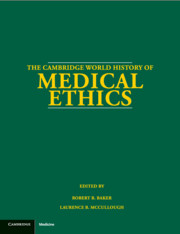Book contents
- Frontmatter
- PART I AN INTRODUCTION TO THE HISTORY OF MEDICAL ETHICS
- PART II A CHRONOLOGY OF MEDICAL ETHICS
- PART III DISCOURSES OF MEDICAL ETHICS THROUGH THE LIFE CYCLE
- PART IV THE DISCOURSES OF RELIGION ON MEDICAL ETHICS
- PART V THE DISCOURSES OF PHILOSOPHY ON MEDICAL ETHICS
- PART VI THE DISCOURSES OF PRACTITIONERS ON MEDICAL ETHICS
- PART VII THE DISCOURSES OF BIOETHICS
- 38 The Discourses of Bioethics in the United States
- 39 The Discourses of Bioethics in the United Kingdom
- 40 The Discourses of Bioethics in Western Europe
- 41 The Discourses of Bioethics in Post-Communist Eastern Europe
- 42 The Discourses of Bioethics in Latin America
- 43 The Discourses of Bioethics in East Asia
- 44 The Discourses of Bioethics in South Asia
- 45 The Discourses of Bioethics in Sub-Saharan Africa
- PART VIII DISCOURSES ON MEDICAL ETHICS AND SOCIETY
- Appendix: Biographies: Who Was Who in the History of Medical Ethics
- Bibliography
- Index
45 - The Discourses of Bioethics in Sub-Saharan Africa
from PART VII - THE DISCOURSES OF BIOETHICS
Published online by Cambridge University Press: 28 May 2012
- Frontmatter
- PART I AN INTRODUCTION TO THE HISTORY OF MEDICAL ETHICS
- PART II A CHRONOLOGY OF MEDICAL ETHICS
- PART III DISCOURSES OF MEDICAL ETHICS THROUGH THE LIFE CYCLE
- PART IV THE DISCOURSES OF RELIGION ON MEDICAL ETHICS
- PART V THE DISCOURSES OF PHILOSOPHY ON MEDICAL ETHICS
- PART VI THE DISCOURSES OF PRACTITIONERS ON MEDICAL ETHICS
- PART VII THE DISCOURSES OF BIOETHICS
- 38 The Discourses of Bioethics in the United States
- 39 The Discourses of Bioethics in the United Kingdom
- 40 The Discourses of Bioethics in Western Europe
- 41 The Discourses of Bioethics in Post-Communist Eastern Europe
- 42 The Discourses of Bioethics in Latin America
- 43 The Discourses of Bioethics in East Asia
- 44 The Discourses of Bioethics in South Asia
- 45 The Discourses of Bioethics in Sub-Saharan Africa
- PART VIII DISCOURSES ON MEDICAL ETHICS AND SOCIETY
- Appendix: Biographies: Who Was Who in the History of Medical Ethics
- Bibliography
- Index
Summary
INTRODUCTION
Ethics in the practice of medicine was not an alien concept in much of African history (see Chapter 19). Most African traditional healers had closely guarded codes of ethics, which were passed down from one generation to the next. Some of these codes embodied concepts found in the Hippocratic tradition such as confidentiality and privacy. Similarly, bioethics, broadly defined, is not an entirely new notion in Africa. Many African cultures understood the sacred interdependency among the health of individuals, communities, and ecological systems. It was a common belief that the morality of one's actions had consequences, positive or negative, on one's own health, the collective health of the populace, and the environment.
Godfrey Tangwa, an African philosopher–bioethicist asserts that African ethical and metaphysical ideas have over the ages been shaped and colored by its ecological, biological and cultural diversity. He argues that within the African world view, the distinction among plants, animals, and inanimate material, and between the sacred and the profane, matter and spirit, and the communal and the individual is a slim and flexible one. Similarly, metaphysical conceptions, ethics, customs, laws, and taboos form a single continuum (Tangwa 1999, 5).
A discussion of the “emergence” of bioethics in Africa is therefore slightly misleading because bioethics has always been a part of the African way of life. In reality, the emergence refers to the globalization of bioethics (Knowles 2001, 254).
- Type
- Chapter
- Information
- The Cambridge World History of Medical Ethics , pp. 525 - 530Publisher: Cambridge University PressPrint publication year: 2008



